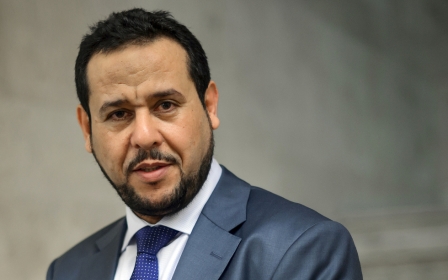British spy chief's alleged role in abducting Libyan torture victim to be revealed

The role of Britain's intelligence service in the rendition and torture of an opponent of former Libyan dictator Muammar Gaddafi is set to be exposed in a case at London's High Court.
The High Court will hear a challenge to the Crown Prosecution service's (CPS) 2014 decision not to prosecute an ex-MI6 director for his role in sending a family to Gaddafi's torture chambers.
The case, which is likely to send shockwaves through the British intelligence community, will hear the application for a judicial review of the CPS's decision not to charge MI6's former counterterrorism director, Sir Mark Allen, over the abduction of Abdel Hakim Belhaj and his pregnant wife, who were transferred to Libya in a joint CIA-MI6 operation in 2004.
READ: Belhaj lawyer: UK government has 'allergy to the truth'
The case of Belhaj came to light after the fall of Tripoli in 2011, when faxes from Allen describing the rendition flights were discovered by Human Rights Watch in the ransacked office of Moussa Koussa, Libya's head of intelligence.
In a letter to Koussa, Allen said: "I congratulate you on the safe arrival of [Belhaj]. This was the least we could do for you and for Libya to demonstrate the remarkable relationship we have built over recent years."
He also said: "Amusingly, we got a request from the Americans to channel requests for information from [Belhaj] through the Americans. I have no intention of doing any such thing."
The High Court's decision could mean Belhaj's legal team can apply for confidential documents about MI6's part in the rendition of Belhaj to be shown to the court, a move that could embarrass the CPS.
Dropped due to 'insufficient evidence'
The review comes after the CPS dropped a case against the former MI6 director due to "insufficient evidence" after the London Metropolitan Police submitted a 28,000-page dossier, which suggested there were grounds for Allen to be charged.
Disheartened by the decision, Belhaj told Middle East Eye that he was more determined to pursue the case "to the end" after it was dropped by the CPS.
"I am not sure I will win, but I'm going to stick with it until the end," he said.
READ: Libyan torture victim Belhaj vows to fight case against UK officials 'to the end'
Speaking from Istanbul, Belhaj said that he will not drop the case against the British officials implicated in his torture until he receives an apology and symbolic compensation of £1.
Some of the senior officials involved implicated in his case include former British foreign secretary Jack Straw.
"I am not interested in revenge, but only for the British government or those involved in the case to admit to and apologise for what happened," said Belhaj.
Belhaj and his wife Fatima Bouchar, who was pregnant at the time, were seized along with their four children in Bangkok in 2004 while travelling to the UK to claim asylum.
They were then transferred to Tripoli in a joint MI6-CIA operation.
'Deal in the desert' under renewed scrutiny
Human rights group Reprieve and law firm Leigh Day, who are representing Belhaj, filed the judicial review of the CPS decision in October 2016.
Commenting on the review, Cori Ryder, a lawyer who represents rendition victims on behalf of Reprieve, said: "The CPS decision not to charge anyone for these abductions never made sense.
"If Britain's security services can help the CIA abduct children and a pregnant woman with absolutely no sanction, what is to stop some ambitious MI6 officer doing it again for Donald Trump?"
The case has brought renewed scrutiny to the controversial "deal in the desert" made between Blair and Gadaffi in a tent days after Belhaj was renditioned back to Tripoli.
It has been alleged that the UK agreed to bring Libya in from the cold, including by sending Belhaj back to Tripoli, in return for the North African country giving up its chemical weapons.
Stay informed with MEE's newsletters
Sign up to get the latest alerts, insights and analysis, starting with Turkey Unpacked
Middle East Eye delivers independent and unrivalled coverage and analysis of the Middle East, North Africa and beyond. To learn more about republishing this content and the associated fees, please fill out this form. More about MEE can be found here.





